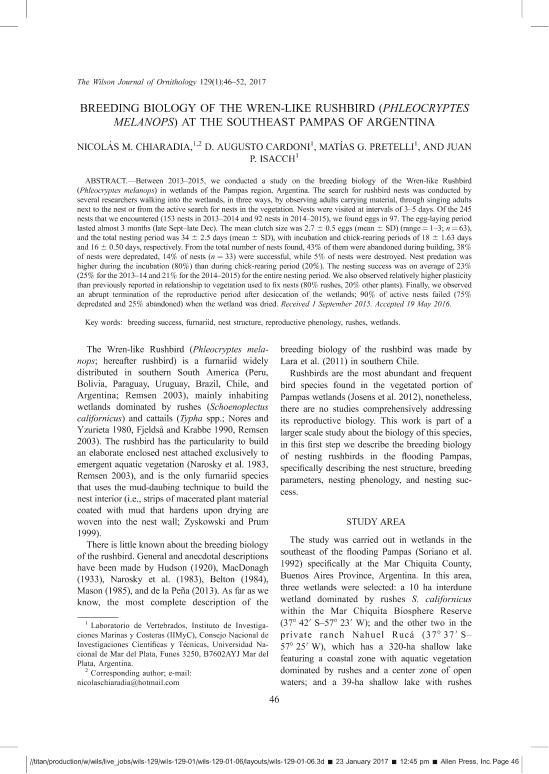Artículo
Breeding biology of the Wren-like Rushbird (Phleocryptes melanops) in the southeast Pampas of Argentina
Chiaradia, Nicolas Mariano ; Cardoni, Daniel Augusto
; Cardoni, Daniel Augusto ; Pretelli, Matías Guillermo
; Pretelli, Matías Guillermo ; Isacch, Juan Pablo
; Isacch, Juan Pablo
 ; Cardoni, Daniel Augusto
; Cardoni, Daniel Augusto ; Pretelli, Matías Guillermo
; Pretelli, Matías Guillermo ; Isacch, Juan Pablo
; Isacch, Juan Pablo
Fecha de publicación:
03/2017
Editorial:
Wilson Ornithological Society
Revista:
Wilson Journal of Ornithology
ISSN:
1559-4491
e-ISSN:
1938-5447
Idioma:
Inglés
Tipo de recurso:
Artículo publicado
Clasificación temática:
Resumen
Between 2013-2015, we conducted a study on the breeding biology of the Wren-like Rushbird (Phleocryptes melanops) in wetlands of the Pampas region, Argentina. The search for rushbird nests was conducted by several researchers walking into the wetlands, in three ways: by observing adults carrying material, through singing adults next to the nest or from the active search for nests in the vegetation. Nests were visited at intervals of 3-5 days. Of the 245 nests that we encountered (153 nests in 2013-2014 and 92 nests in 2014-2015), we found eggs in 97. The egg-laying period lasted almost 3 months (late Sept-late Dec). The mean clutch size was 2.7 ± 0.5 eggs (mean ± SD) (range = 1-3; n = 63), and the total nesting period was 34 ± 2.5 days (mean ± SD), with incubation and chick-rearing periods of 18 ± 1.63 days and 16 ± 0.50 days, respectively. From the total number of nests found, 43% of them were abandoned during building, 38% of nests were depredated, 14% of nests (n = 33) were successful, while 5% of nests were destroyed. Nest predation was higher during the incubation (80%) than during chick-rearing period (20%). The nesting success was on average of 23% (25% for the 2013-14 and 21% for the 2014-2015) for the entire nesting period. We also observed relatively higher plasticity than previously reported in relationship to vegetation used to fix nests (80% rushes, 20% other plants). Finally, we observed an abrupt termination of the reproductive period after desiccation of the wetlands; 90% of active nests failed (75% depredated and 25% abandoned) when the wetland was dried.
Archivos asociados
Licencia
Identificadores
Colecciones
Articulos(IIMYC)
Articulos de INSTITUTO DE INVESTIGACIONES MARINAS Y COSTERAS
Articulos de INSTITUTO DE INVESTIGACIONES MARINAS Y COSTERAS
Citación
Chiaradia, Nicolas Mariano; Cardoni, Daniel Augusto; Pretelli, Matías Guillermo; Isacch, Juan Pablo; Breeding biology of the Wren-like Rushbird (Phleocryptes melanops) in the southeast Pampas of Argentina; Wilson Ornithological Society; Wilson Journal of Ornithology; 129; 1; 3-2017; 46-52
Compartir
Altmétricas



